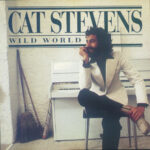 Cat Stevens’ “Wild World” is one of those rare songs that manages to feel at once intimate and universal, a piece of music that speaks directly to an individual listener while simultaneously capturing the emotional complexity of a generation. Released in 1970 on his breakthrough album Tea for the Tillerman, the song emerged during a period of profound change for both its creator and the wider world. Cat Stevens—born Steven Demetre Georgiou in London—had already experienced the highs and lows of the music industry by the time he recorded “Wild World.” After a brush with tuberculosis and a life-threatening collapse that forced him to take a long break from touring, he reemerged with a deeper, more reflective approach to songwriting. Gone was the flashy pop of his early singles like “I Love My Dog” and “Matthew and Son.” In its place was a more introspective, folk-driven sound that prized lyrical honesty and spiritual yearning. “Wild World,” with its gentle melody and bittersweet lyrics, perfectly encapsulated this transformation and became one of the defining songs of his career.
Cat Stevens’ “Wild World” is one of those rare songs that manages to feel at once intimate and universal, a piece of music that speaks directly to an individual listener while simultaneously capturing the emotional complexity of a generation. Released in 1970 on his breakthrough album Tea for the Tillerman, the song emerged during a period of profound change for both its creator and the wider world. Cat Stevens—born Steven Demetre Georgiou in London—had already experienced the highs and lows of the music industry by the time he recorded “Wild World.” After a brush with tuberculosis and a life-threatening collapse that forced him to take a long break from touring, he reemerged with a deeper, more reflective approach to songwriting. Gone was the flashy pop of his early singles like “I Love My Dog” and “Matthew and Son.” In its place was a more introspective, folk-driven sound that prized lyrical honesty and spiritual yearning. “Wild World,” with its gentle melody and bittersweet lyrics, perfectly encapsulated this transformation and became one of the defining songs of his career.
At its core, “Wild World” is a song of parting and concern, a farewell disguised as a love ballad. Stevens wrote it in the wake of a breakup with actress Patti D’Arbanville, who inspired several of his most enduring compositions. The lyrics address a young woman striking out on her own, with the narrator offering both a warning and a blessing: “Oh baby baby, it’s a wild world / It’s hard to get by just upon a smile.” The line walks a delicate balance between affectionate advice and veiled criticism. There is love in the narrator’s voice, but also a sense of resignation, even a hint of possessiveness, as if he is reluctant to let go while knowing he must. This emotional ambiguity gives the song its lasting power. Rather than a simple goodbye, it becomes a meditation on the difficulty of releasing someone you care about into an unpredictable world.
Musically, “Wild World” reflects Stevens’ gift for crafting melodies that feel timeless and inevitable, as though they have always existed. The song is built around a descending chord progression that echoes the folk and pop traditions of the 1960s, but Stevens infuses it with his own distinctive phrasing and rhythmic subtlety. The guitar work is crisp and understated, allowing his warm, slightly husky vocals to carry the emotional weight. Producer Paul Samwell-Smith, formerly of the Yardbirds, provides a light but steady hand, keeping the arrangement uncluttered so that every note and syllable feels essential. The result is a track that sounds both delicate and sturdy, a perfect vehicle for the lyrical message of vulnerability and resilience.
Part of what makes “Wild World” so enduring is its universality. Though rooted in the specifics of Stevens’ relationship with D’Arbanville, the song speaks to anyone who has faced the pain of separation or the fear of letting a loved one venture into uncertain territory. Parents hear it as a message to children leaving home, lovers as a farewell to a partner seeking independence, friends as a reminder of life’s unpredictable turns. The imagery of a “wild world” captures the mix of beauty and danger inherent in adulthood, and the repeated assurance—“I’ll always remember you like a child, girl”—carries both tenderness and melancholy. It is a song about love, but also about growth, and the recognition that love sometimes means stepping back.
The timing of its release only amplified its resonance. The early 1970s were a period of cultural upheaval, with the optimism of the 1960s giving way to political unrest, economic uncertainty, and a growing sense of disillusionment. Against this backdrop, “Wild World” offered a gentle but sobering message: the world can be harsh, but kindness and memory endure. Its folk-pop sound fit neatly alongside contemporaries like James Taylor, Joni Mitchell, and Crosby, Stills & Nash, yet Stevens brought a distinctive international flair to his music, blending Western folk with traces of Eastern melodies that hinted at the spiritual journey he would later pursue.
Commercially, the song was a triumph. Released as a single in late 1970, “Wild World” became Stevens’ first major hit in the United States, reaching the Top 20 on the Billboard Hot 100 and helping Tea for the Tillerman become a critical and commercial success. The album itself would go on to be hailed as a classic of the singer-songwriter era, cementing Stevens’ reputation as one of the most thoughtful and melodic artists of his time. In the United Kingdom, the song also charted strongly, and it quickly became a staple of FM radio, its gentle acoustic strumming and unforgettable chorus cutting through the heavier sounds that dominated rock playlists of the day.
But like many enduring pop songs, “Wild World” has also sparked debate. Some listeners have interpreted the lyrics as paternalistic, even condescending, with the narrator warning the woman of the dangers of independence while positioning himself as the wise, protective figure. Lines like “I’ll always remember you like a child, girl” can be read as affectionate, but they also carry an undercurrent of control, as if the speaker cannot fully accept the woman’s growth into adulthood. Cat Stevens himself has acknowledged the personal nature of the song but has generally resisted overanalyzing its meaning, preferring to let listeners draw their own conclusions. This ambiguity has only fueled its longevity, inviting new interpretations with each generation.
Over the decades, “Wild World” has inspired countless covers, each highlighting different facets of its emotional landscape. Jimmy Cliff recorded a reggae-inflected version in 1970 that became a hit in the United Kingdom, giving the song a lilting, island rhythm that contrasted with the melancholy of Stevens’ original. Maxi Priest later brought it back to the charts in 1988 with a slick reggae-pop rendition that introduced the song to yet another generation of listeners. Other artists, from Mr. Big to Guster, have offered their own interpretations, underscoring the song’s flexibility and its ability to transcend genre. Each version, whether faithful or radical, serves as a testament to the strength of the songwriting—a melody and message so sturdy that they can be reshaped without losing their core.
For Cat Stevens himself, “Wild World” marked the beginning of a remarkable creative run that would produce a series of beloved albums, including Teaser and the Firecat, Catch Bull at Four, and Foreigner. Yet even as his fame grew, Stevens remained restless. By the late 1970s he experienced a spiritual awakening, converting to Islam and adopting the name Yusuf Islam. He stepped away from the music industry for decades, focusing on family, education, and humanitarian work. When he eventually returned to performing in the 2000s, “Wild World” was one of the songs that bridged his past and present, allowing him to reconnect with audiences who had grown up with his music while sharing the wisdom he had gained during his years away. In concert, the song takes on new layers of meaning, not just as a farewell to a former lover but as a message of care to a world still struggling with conflict and uncertainty.
Listening to “Wild World” today, more than half a century after its release, it is striking how fresh it still sounds. The acoustic guitar remains crisp, the vocal delivery warm and immediate. Its themes of love, loss, and cautious hope are as relevant as ever, speaking to the timeless human experience of watching someone you love step into an unpredictable future. In an era defined by constant change and global upheaval, the song’s central message—that the world can be frightening but love endures—retains its quiet power. It is a reminder that goodbyes, while painful, are also acts of love, and that offering guidance, even imperfectly, is a way of staying connected.
The song’s staying power also lies in its dual perspective. It is both a message to someone else and a reflection of the singer’s own fears and hopes. When Cat Stevens sings, “It’s hard to get by just upon a smile,” he could just as easily be speaking to himself, acknowledging the difficulties of navigating fame, relationships, and the pressures of adulthood. That self-awareness, combined with the gentle compassion of the melody, gives “Wild World” an emotional depth that continues to resonate across generations. It is a song that feels like a conversation—one that invites listeners to think about their own departures, their own loved ones venturing into the unknown.
Ultimately, “Wild World” endures because it captures a universal truth with elegance and grace. It acknowledges the pain of letting go while offering comfort, recognizing that love sometimes means stepping aside. Cat Stevens’ ability to express that truth in a melody so simple and a lyric so memorable is a testament to his genius as a songwriter. More than five decades after he first strummed its opening chords, the song remains a gentle hand on the shoulder, a warm voice saying, “Be careful out there, but know that you are loved.” In a world that can still feel as wild as ever, that message has lost none of its relevance or beauty.


